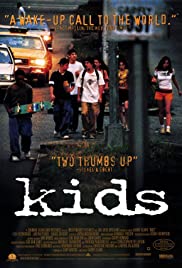Kids
Kids
Starring Leo Fitzpatrick, Justin Pierce, Chloe Sevigny, Rosario Dawson
Directed by Larry Clark
"Kids" was released in 1995, when I was fifteen years old, so the storyline was practically tailor-made for me - however, since it was rated NC-17, I couldn't see it, although honestly I never heard of it until I was well into my twenties. Watching it now, it's shattering and unnerving, an unflinching documentary-style film showcasing the depravity of a group of teenagers who see life as nothing more than getting high, finding your next lay, stealing, beating people up, and basically living a life of uncaring narcissism. While it was released fifteen years ago, many of those same concepts hold true in the lives of teenagers today, with a darker, more pronounced feel.
Telly (Leo Fitzpatrick) is a teen who only has one real desire: to deflower as many virgins as he can, because in his mind it'll make him immortal because he feels that the girls will never forget the one who took their virginity away. His best friend Casper (Justin Pierce) idolizes Telly for this, and is pretty much just as depraved as his friend -he steals liquor from a store, beats a man in the park, and urinates in public with no sense of remorse. They spend their day going from house to house, getting high, and drunk, and looking for Telly's next conquest - a younger sister of a friend of his.
Meanwhile, Jennie (Chloe Sevigny), one of Telly's former conquests, goes to get a HIV-test with her friend Ruby (Rosario Dawson) only because Ruby wants someone to go with her since she's had so many partners, while Jennie has just been with Telly. The results of the test shakes both the girls, leading Jennie on a frantic night search for Telly.
While the film could be seen as a cautionary tale about the AIDS epidemic, it doesn't feel that way - in fact, it doesn't feel like there's any uplifting, important message at all. It feels more like a documentary chronicling one day in the lives of a bunch of delinquents in every sense of the word, characters with absolutely no moral center or redeeming quality among them, filling the movie from start to finish with a chaotic loss of control. That's what makes the film so profound and prolific, a movie that almost demands an updated version because of how the youth see the world today.
Back in the 90s, AIDS was the biggest issue facing teenagers, as they began experimenting with sex and drugs against the fearful backdrop of the disease that seemingly has lost its fearful punch in today's world (even "South Park" made fun of the seemingly inconsequential nature of AIDS today, when Cartman might've contracted the virus, but the others around him don't care because "its not as bad as cancer"). There's a very interesting scene near the beginning of the film as director Larry Clark maneuvers the story between the guys and girls in different settings, discussing the nature of sex and AIDS. Casper comments that AIDS might not even exist, because he doesn't know anyone who has it (which seems rather counterpart to some people today believing Coronavirus doesn't exist because they don't know anyone who has it either), while the girls are almost flippant about the disease as well, until Ruby reveals that she and Jennie went to get tested themselves. Today, a film of this caliber would probably discuss the ramifications of cyberbullying and social media influence - even though documentaries like "Bully" have already discussed it.
Clark cast a bunch of unknowns for his film, and two of them have gone on to achieve superstardom since then. Leo Fitzpatrick plays Telly perfectly - a complete narcissist with a vile, snake-like charm that convinces young virgins (and by "young," I mean young) to allow him to take their virginity from them, only to have him brag and gloat about it later to his friends. Telly is a vile character, and it's to Fitzpatrick's credit that he turned out that way. Justin Pierce (who tragically killed himself in 2000), plays Telly's friend Casper with the same sense of vileness, especially for what he does to a character later on in the film. Both these boys are no one to look up to, and doesn't even serve as a cautionary tale because they'll never learn anything from their actions.
Chloe Sevigny (in her first role) plays Jennie as the most adult of the group, a girl who finds her world shattered in an instant, and sets out to do the right thing - but even she isn't capable of always doing what's right. Also in her first starring role, Rosario Dawson serves more as a supporting character for Jennie, who's not given a lot of screen time, but makes a profound impact in the rare moments we see her on screen.
The film was shot in Manhattan, but the camera hardly ever leaves the teenagers' world, showcasing the true egotistic world of the characters. They are their own world, there's no consequences for their actions, and no one exists in their world except themselves. The script was written by a then-19 year old named Harmony Korine, and it almost feels like the characters fly off the cuff and ad-lib most of their lines: in reality, they actually were pretty much verbatim off the script. It's really an interesting thing to see, something you want to look away from but can't help but continue to watch, knowing that they'll be no happy ending.
A defining coming-of-age style film for the 90s generation, "Kids" rightfully earned its provocative title by profiling the lives of teenagers in their most depraved, sadistic way that doesn't serve as a cautionary tale of the AIDS epidemic, but very well could.
The Score: A+




Comments
Post a Comment